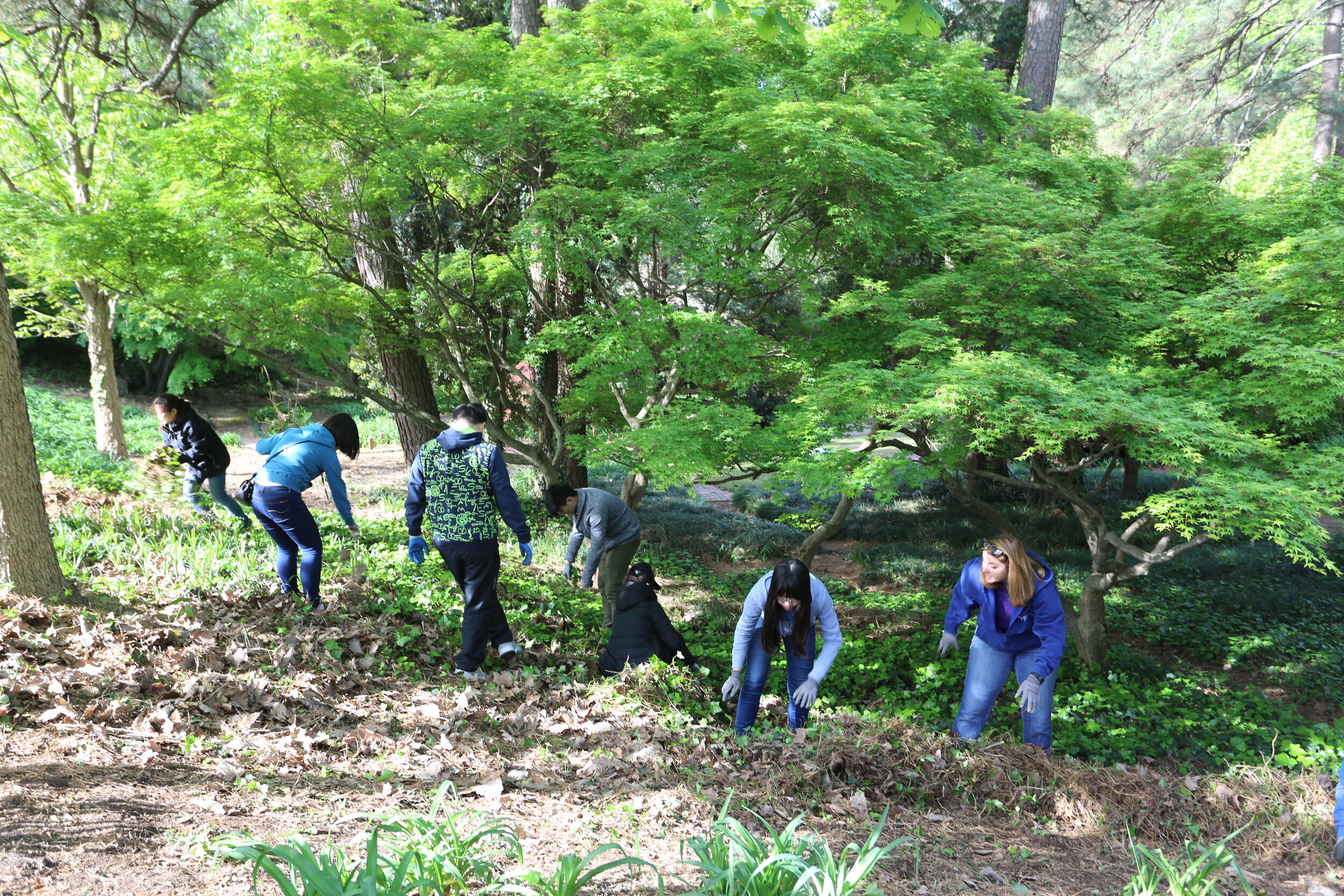Garden and Forest Fun: Earth Day Event in Jaycee Park
By JASON ZICHENG JIN and ERIN HOLLOWAY
Editor: MICHELLE DANNER
April 22nd is Earth Day, an American holiday dedicated to clean and protect our common mother: Earth. For the final service event for the Fall ‘15 cohort, UPP partnered with the North Carolina State government’s Parks and Recreation Department. Students visited Jaycee Park on April 16, 2016 and helped remove invasive species from the nature trails. They also developed the lily garden. Considering the temperamental weather in NC this semester, it was great for students to experience a field trip on such a sunny, clear day!
“This is really an interesting event,” Yuhan Pan, a 2015 UPP student, said.
The goals of this event were to teach students about Earth Day as a holiday, to think about how human activity can damage the environment, and what we can do to solve issues. Common Earth Day activities include reducing the amount of water or electricity one uses, recycling, planting trees, or removing pollution. UPP students also learned about the concept of invasive species and the importance of removing them, as well as local ecology information such as plants, birds and insects native to the area. This event also encouraged teamwork and critical thinking regarding the impacts of human activity.
“It is meaningful and useful, and I can get knowledge that I cannot learn from class,” Tianming Liu said.
Thirty-two students attended the event, arriving at Jaycee Park at about 9am. Considering that some students might not have had breakfast or might get hungry around lunch time, UPP provided snacks: bananas, apples, and almond biscuits in addition to the granola bars and bottled water park staff provided.
Leigh Bragassa, the Invasive Species Coordinator, explained the concept of invasive species (foreign plants or animals that, due to not being native inhabitants, cause damage to the local ecosystem) and how they can disrupt native species or even cause extinctions. For this event, students were shown two common invasive species in Raleigh: English ivy and poison oak, which are both crawling vines that can choke adult trees and outcompete most native ground-covering plants. Students wore protective gloves, glasses and were given poison ivy/oak after-exposure cream to protect against any allergic reactions. For many of the students, this was the first time they worked in a forest setting.
“As children and young adults, we need to learn to work hard and play hard to endure hardship,” Yuquan Cui said.
The UPP group was divided into two teams: one team worked on revitalizing the lily garden and the other larger team helped remove English Ivy and poison oak from the trees on the nature trails. The first group removed weeds from the garden and replenished the pine-straw to protect the garden and prevent weeds. This team also collected echinacea down from the tree. The other team used saws, hand clippers and larger clippers to remove the strangling vines from native pine, cherry and oak trees by cutting as close to the base of the tree as possible and removing the first foot or so of the vine growth. When English ivy matures, the vines can grow very thick and interconnected, creating a second “skin” that obscures the tree’s actual bark almost entirely. The predominant dangers of this occurring include stifling the tree’s growth, killing the tree and undergrowth (by hogging all the sunlight) and contributing to tree collapse due to the tree’s inability to sway in the wind.
“This activity is meaningful since it not only cuts ivy and removes weeds, but it also lets us see trees, wildlife and people,” Xinhua Du said. “We can learn from them and get the knowledge of plants from them.”
Removing English Ivy vines, an invasive species in NC
Students in this group worked in smaller groups all along the Jaycee Park trails until about 11:30 am. The difference in the trees was incredible! So many young pines that had been all but swallowed by English ivy were finally free, and imposing masses of the ivy were cleared away. “In about three weeks, all the vines above the cut will die and break off,” Ms. Bragassa said.
For many of the students, seeing the results of their hard work was satisfying.
“The feeling was great when I cut the vines and removed them from trees,” Naining Xu said. “It did release my stress and I could see the beautiful view at the same time.”
Jaycee Park staff were impressed with the amount of teamwork, dedication and focus that UPP students displayed during the event, commenting that our students are coachable and quick learners. Park staff were also glad to see that so many young people have an interest in helping the environment. Ms. Bragassa and Ashley Deans, the volunteer coordinator, really appreciated our help and efforts.
Also, some students said that this event was their first experience with Earth Day.
From our feedback from students and staff at the park, students gained many benefits from this event, such as knowledge about American holidays, invasive species and local wildlife; stress relief;and enjoying nature and teamwork. For some, this was a welcomed chance to exercise too, considering many have holed up in their rooms preparing for final exams.





